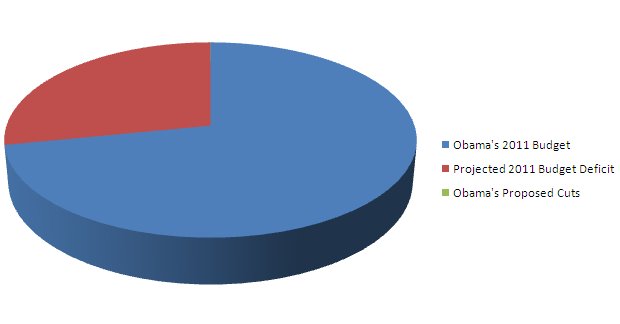Obama has released his 2012 budget, making cuts that he and others have described as “painful” or “dramatic.” As George Mason University Economics professor Don Boudreaux wrote, “Only by Washington standards does a two-percent spending cut qualify as ‘dramatic.'”
So why are these “painful” and “dramatic” cuts?
For starters, the cuts are hardly noticeable or game-changers for the federal budget and the national debt. As Dan Mitchell from Cato noted, a lot of the factors that they rely on to decrease the debt only work if the economy is completely turned around–a factor that is a non-starter as there is no indication of a huge improvement on the horizon.
The same crowd that is crying over these proposed “cuts” has never cried or described the current national debt as being “painful” or dramatic”. Keep that in mind when the pundits try to explain Obama’s budget over the coming days and weeks.
White House OMB Director Jack Lew describes the cuts as having “a lot of pain”:
“I wish I could stand here and say that we were on the edge of a surplus. When I left my last day in office I went to Congress and testified and projected $5.6 trillion surplus for the next ten years,” Lew told me. “I came back ten years later to look at projections of over $10 trillion in debt over the next ten years. It’s enough to break your heart. It’s going to take us a lot of hard work just to get to the point where we are not adding to the debt.”
But Lew also insists that Obama’s budget will make a real difference – and cause real pain.
“What I would tell you about this budget is it has a lot of pain…it does the job, it cuts the deficit in half by the end of the president’s first term, it has $400 billion of savings which would bring spending on domestic discretionary spending down to the level it was at in the Eisenhower administration and we have made tough choices,”
…
And Lew made no apologies for failing to take on entitlements as recommended by the President’s own budget commission – which detailed almost four times the deficit reduction in Obama’s budget.
“I have been doing this for almost 30 years and I think that if you look over the course of the last three decades it’s not possible to come up with an example where putting a controversial proposal out there has really made the difference in terms of bridging the bi-partisan chasm that you need in order to get something done. That happens by building trust, by developing relationships, by working together,” Lew said.
If you would like to look at Obama’s budget yourself, click here.
Senate Minority Leader Mitch McConnell has called Obama’s budget “unserious” and “irresponsible”:
“This is not an ‘I got the message’ budget,” McConnell said in a floor speech. “It’s unserious and it’s irresponsible.”
Earlier on Monday, House Republicans also gave Obama’s $3.7 trillion budget the thumbs down, with Speaker John Boehner (R-Ohio) saying it would “destroy” jobs, not create them.
“By continuing the spending binge and imposing massive tax hikes on families and small businesses, it will fuel more economic uncertainty and make it harder to create new job,” Boehner said.
Dan Mitchell from Cato has some more on Obama’s budget, including some information on the spending increases:
This new budget may be better than Obama’s first two fiscal blueprints, but that’s damning with faint praise. The absence of big initiatives such as the so-called stimulus scheme or a government-run healthcare plan simply means that there’s no major new proposal to accelerate America’s fiscal decline.
But neither is there any plan to undo the damage of the past 10 years, which resulted in a doubling in the burden of government spending during a period when inflation was less than 30 percent.
Moreover, many of the supposed budget savings (such as nearly $40 billion of lower jobless benefits) are dependent on better economic performance. I certainly hope the White House is correct about faster growth and more job creation, but they’ve been radically wrong for the past two years and it might not be wise to rely on optimistic assumptions.
Some of the fine print in the budget also is troubling, such as Table 4.1 of OMB’s Historical Tables of the Budget, which shows that some agencies are getting huge increases, including:
- 17 percent more money for International Assistance Programs;
- 24 percent more money for the Executive Office of the President;
- 13 percent for the Department of Transportation; and
- 12 percent more for the Department of State.
But these one-year changes in outlays are dwarfed by the 10-year trend. Since 2001, spending has skyrocketed in almost every part of the budget. Even with the supposed “cuts” in Obama’s budget, there will be:
- 112 percent more spending for the Department of Agriculture;
- 100 percent more spending for the Department of Education;
- 154 percent more spending for the Department of Energy;
- 110 percent more spending for the Department of Health and Human Services;
- 175 percent more spending for the Department of Labor; and
- 82 percent for the Department of Transportation.
And here is Obama’s proposed budget cuts put into visual perspective:
Only in Washington, where politicians and bureaucrats have a spending addiction that makes Lindsay Lohan’s life look ideal, could any person that has a hand in the current fiscal mess say that stopping the problem is “painful” and “dramatic”.
The cuts offered by Obama are quite ridiculous and leaves the rest of us taxpayers that are left paying the bill wondering how this will work out in the end. This isn’t “Winning the Future”, it’s “Paying for today with the future”.








